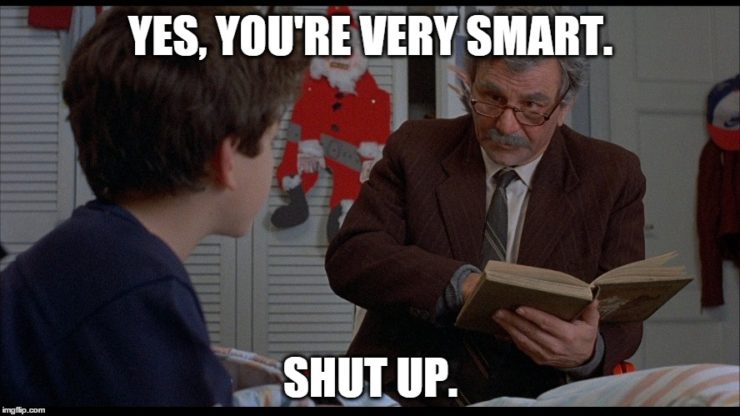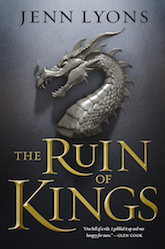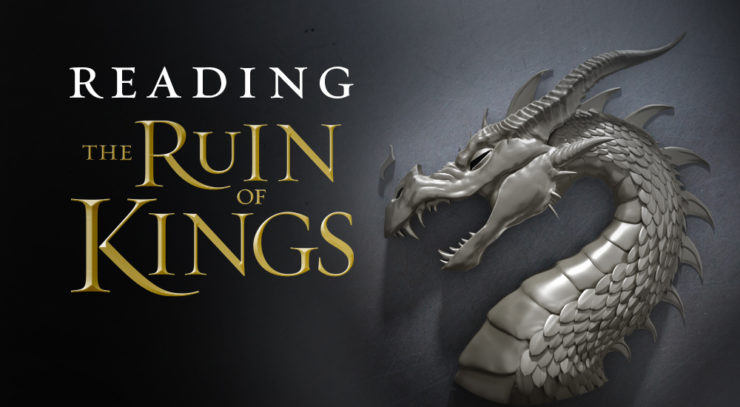Hello, Tor.com, your Auntie Leigh here! Have you missed me? I’ve missed you! But I return to the fold today with a Very Important Message for you. Are you listening? Awesome, here it is:
Beginnings are important.
There’s a definite flavor of “duh” to that statement, I know. Um, yeah, you say, of course beginnings are important, if we didn’t begin things we wouldn’t have things. Okay, yes, true. But, I contest, the beginnings of some kinds of things are more important than those of other things.
Stop being so damn vague, you say? Okay, how’s this: the beginnings of stories are important.
Also a “duh” statement, possibly. But, possibly, not.
The beginning of a story is vital. I would argue, in fact, that the beginning of a story is more important than any other part of it, including the end. Which may seem like nonsense, but think about it: if you aren’t intrigued enough by the beginning of a story to keep reading, it doesn’t really matter whether the end is good or not, does it? You’ll never get there to find out. A story without an audience is no story at all.
Why do I say that? And what does this have to do with the nifty artwork up there for a certain upcoming series, hmm? Well, if this beginning was enough to entice you to want to know more, click on to find out!
This conundrum, I would say, is the eternal bugbear of writers and storytellers of every stripe and medium: how to craft the beginning of your tale so as to irresistibly lure your audience in, and keep them from closing the book or hitting the “back” button long enough to get them firmly hooked, and committed unto the end. It may sound like it should be easy, but I am here to tell you: it ain’t.
It is an especially hairy proposition for the creators of what we will call, broadly, epic fantasy, because you’re not only generally asking for a much larger time commitment from your audience (according to the rules I just made up, anything fewer than a trilogy or skinnier than a ruler ain’t epic enough to be considered “epic fantasy”), but you’re also asking them to become invested in a setting where they not only won’t know the characters or the plot, but they won’t know the setting, the culture, the history or indeed even the basic laws of reality of the story. There’s a required learning curve there that’s sharper than perhaps any other genre outside the speculative fiction umbrella.
’Tis a knotty problem, is what I’m saying. And one that is solved—or not solved—in a myriad of ways. Here, have a quick list of a few!
The Prologue

If you’ve consumed any kind of fantasy as a regular thing at all, you’ve come across this one, as it has long been a favorite with epic fantasy writers, especially of, shall we say, a certain age. As you know, Bob, in the Prologue approach, the story is prefaced with a short scene or set of scenes, usually not involving the protagonist(s), but instead focusing on supporting or one-off characters (or, sometimes, the villains), detailing events which are related to but not directly connected to the main storyline. This lets the author establish the setting, tone, and the stakes of the larger story without throwing the reader/viewer directly into the deep end, so to speak.
Both Robert Jordan’s Wheel of Time series and George R.R. Martin’s A Song of Ice and Fire series, about as quintessential examples of modern epic fantasy as you’re likely to find, take this approach. The Eye of the World’s Prologue shows us a scene set some three thousand years before the start of the main action, featuring a character who never appears in the main story. (Well. Technically. Sort of.) Meanwhile Martin’s A Game of Thrones has an opening contemporaneous with the rest of the story, but solely featuring some poor red shirts, who basically exist to die horribly and establish that everything is about to get really awful for everyone. (As far as establishing a theme for the rest of the series goes: well done!)
Some people can’t stand prologues, and they certainly are a very traditional narrative device, but that doesn’t automatically make them bad. As with most things, it really lies in the execution; and judging by these series in particular, a prologue done right is effective indeed.
The In Medias Res

This one is about the polar opposite of the Prologue approach, and, I must confess, has always been my not-so-secret favorite way to start a story. Its conceit is pretty much what it says on the tin (as long as you can read Latin tins, of course), and I’ve loved it ever since I watched Star Wars: A New Hope as a young girl, and was hopelessly intrigued by the way that (other than a super-brief scroll thingy I barely paid attention to at the time anyway) we were thrown right into the middle of a clearly ongoing story, and left to make our own deductions about what the heck was going on, to be confirmed or debunked as the story continued and more of the backstory was filled in. The opening scene of Star Wars even starts in the middle of an action sequence rather than at its beginning. Awesome.
Some people don’t like this approach either, calling it gimmicky, but those people are losers. (Okay, sometimes it can be gimmicky. And it’s also pretty easy to mess up. But I contend that when done well, it’s one of the best audience-hooking ways to tell a story out there.)
The James Bond

Look, it’s James Bond, being suave/parkouring off a building/fighting a komodo dragon/shooting a jack-booted goon/all those things at once! Just a day in the life for our hero!
This is, possibly thanks to Ian Fleming’s Bond (but probably more thanks to Joseph Campbell), one of the most common ways to start a story of any kind, especially fantasy stories. In Campbell’s Hero’s Journey, it’s called the “Ordinary World” stage, wherein we meet our hero(ine) doing whatever it is he or she generally does, doo-ti-doo-ti-doo, and from which we both get an idea of their character and capabilities, and have an opportunity to identify and sympathize with them as human beings (or human-adjacent beings, whatever), before the fit hits the shan the hero gets their call to adventure and the real story begins.
And if Bond isn’t an epic fantasy-ish enough example of this for you: Tolkien. Duh.
The Bookend

Then there’s the device where the author sandwiches the main story between (or, sometimes, among), a separate, framing story, which generally serves as commentary on the main story. This one’s much rarer than the other three, and is generally either an utter disaster or completely brilliant in execution. For an example of “completely brilliant”, look no further than William Goldman’s The Princess Bride (both the book and its movie adaptation), which is almost certainly the most famous example of the bookend story device in modern fantasy, and deservedly so.
* * *
So why am I all het up right now about beginnings of stories, you ask? Well, it turns out, I have a pretty good reason to be thinking about them.
Buy the Book


The Ruin of Kings
This is a subject that’s been on my mind, you see, ever since TPTB at Tor.com asked me whether I would be interested in covering the first novel in a new forthcoming series from Tor Books: The Ruin of Kings, by Jenn Lyons. And my response was, am I interested? I don’t know! Send me the first bit and I’ll see. Because, you see, and let’s all say it together: Beginnings are important.
So they did. And fortunately for you, they’ve sent you the first bit as well! So go read it, and then come back and we’ll talk about what I think.
And… hah. Sneaky, Ms. Lyons. Why settle for one kind of beginning when you can have at least two, and maybe three?
First we have the “Forward” (which isn’t labeled as such in the excerpt on the site, but is on my copy; I’m honestly not sure if that’s a deliberate typo or not), consisting of a letter from “Thurvishar D’Lorus” (who may not actually be a pompous ass, but if so he is grievously misnamed) to an as-yet unspecified monarch. This, then, is the rare and elusive bookend beginning, but with a twist, since Thurvishar basically tells us (along with His Majesty) in so many words what the structure of the entire novel will be, which is pretty fun.
Then we jump to the in medias res beginning (yay!) of the interior story, in which we meet the really most sincerely terrifying Talon and her prisoner, the apparently incredibly unlucky Kihrin. Kihrin is obviously our protagonist, but it remains to be seen what Talon is. True, by all appearances so far she is the villain (or at least a villain), but good ol’ Thurvy up there included her along with Kihrin as one of the “two most pivotal individuals to the events”, so at the very least she’s unlikely to be a once-off baddie.
At any rate, Talon, in what I suspect is typically pants-wetting fashion, coerces Kihrin into telling her his story (to un-medias our res, one might say. Okay, fine, nobody but me would say that, shut up), leading us to jump to another beginning (and to a point of view change to the first person). Hilariously, this beginning is also in medias res!
…Or, I suppose, it could be an Ordinary World opening, since being sold as a slave is apparently a regular occurrence for Kihrin? (Which: Dude. You know you’ve got a shitty life when that’s your standard routine.) I think you could view it either way, interestingly enough.
Yeah, so, clearly our author has heard of the concept of “simplistic, straightforward storytelling”, and decided she wants no part of it. (Further evidence: LOL footnotes.)
This is fine by me, personally. Nobody could look at my general approach to sentence structure and conclude I am not a fan of complexity. (See?)
The slave auction scene in general is a great example of how to inject some much-needed expositional worldbuilding into forward-moving plotty action (as opposed to the dreaded standstill of an infodump). And it built up the narrative tension to the chapter break fabulously; I don’t know about you guys, but I’m totally intrigued to know who these hooded bros are, and why they wanted Kihrin so bad they paid a cool million spacebucks for him. The beginning was supposed to hook me, and lo, I am hooked.
And a good thing, too, since this post marks the beginning of my latest blog series for Tor, in which we will be getting a sneak peek at the first 17 chapters of The Ruin of Kings, and I will tell you what I think about it, and you will hopefully tell me what you think about it, and also about what you think of what I think of it. Or something like that.
As a note, I decided that reading ahead is for losers, and I was much more interested to see what would happen if I went in blind to each new chapter, same as you will be. So today’s excerpt is as far as I’ve read, just yet; next week we will be covering Chapter 2, “The Kazivar House”. Ominous!
Beginnings are important, and beginnings of epic fantasy stories are crucial. For my money, as epic fantasy beginnings go, this one is rock solid. I look forward to reading more, and sharing my thoughts with the world, or at least the portion of it that reads this site. Which is the best portion, amirite, eh, eh?
And now that I have outrageously flattered you: tell me what you think! Am I right, am I wrong, has my cheese slipped off my cracker or what? Your thoughts, give me them! And then come join me next Tuesday, same Bat time, same Bat channel, for more! Cheers!
This is an updated version of an article that appeared on July 10th, 2018.
Leigh Butler is a writer, blogger and critic, who feels that humor, weirding of language, and the occasional application of head to desk is the best way to examine the impact of sociocultural issues on popular SF works (and vice versa). She has been a regular columnist for Tor.com since 2009, with three series (so far) to her name: The Wheel of Time Reread, A Read of Ice and Fire, and the Movie Rewatch of Great Nostalgia. She lives in New Orleans, and therefore advises alla y’all to let your good times roll.










